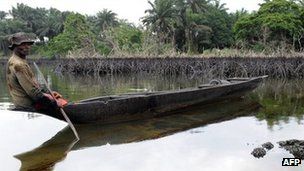 The Niger Delta has few major roads and many villages lack electricity and clean waterOil giant Shell is due to appear in a Dutch court to face charges of polluting Nigerian villages in the Niger Delta region.
The Niger Delta has few major roads and many villages lack electricity and clean waterOil giant Shell is due to appear in a Dutch court to face charges of polluting Nigerian villages in the Niger Delta region.
The case is being brought by four Nigerian farmers and the Dutch branch of campaigners Friends of the Earth.
It is the first time a Dutch multinational is being put on trial in a civil court at home in connection with damage caused abroad.
Shell insists it has been unable to clean up the spills due to insecurity.
The Anglo-Dutch firm also says that more than half of the leaks are caused by theft and sabotage.
The case is linked to spills in the Ogoniland region of southern Nigeria.
The farmers say that oil spills from the oil firm's pipelines have destroyed their livelihoods by damaging crops and fish-farms.
One of the plaintiffs, Friday Alfred Akpan from the village of Ikot Ada Udo, told the BBC the oil leaks in his village had badly damaged his 47 fish ponds.
Legal precedent?
"Fish died as a result of the oil spill, making it difficult for me to live and put my children through school."
He told the BBC's Newsday programme he wanted compensation for the loss, and for Shell to clean up the spill.
A Shell official, Allard Castelein, told the BBC the spills in question "were all caused by sabotage.
"I mean, there's video evidence. There's signed testimonies by joint investigation teams that are constituted of the local municipality, the company, the government."
Militant groups have for years waged a violent campaign in the Niger Delta, demanding that local people see more of the benefits of the region's oil wealth - there is also a huge problem of oil theft in the area.
If the farmers' case is successful it could set a legal precedent, paving the way for thousands of other compensation claims from those affected by oil spills, says the BBC's Anna Holligan in The Hague.
Last year, a report by the United Nations Environment Programme said that over half a century of oil operation in the region, by firms including Shell, had caused deeper damage to the Ogoniland area of the Niger Delta than earlier estimated.
In August, the company accepted responsibility for two specific spills in the region in 2008 and 2009, saying it would settle the case under Nigerian law.
 В Атырау -10
В Атырау -10